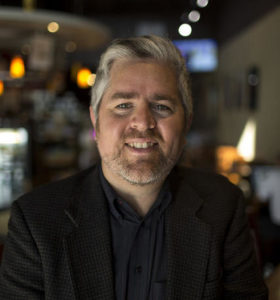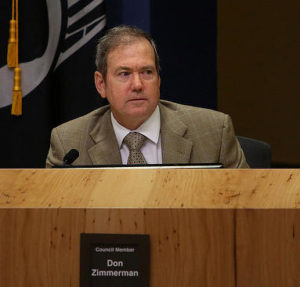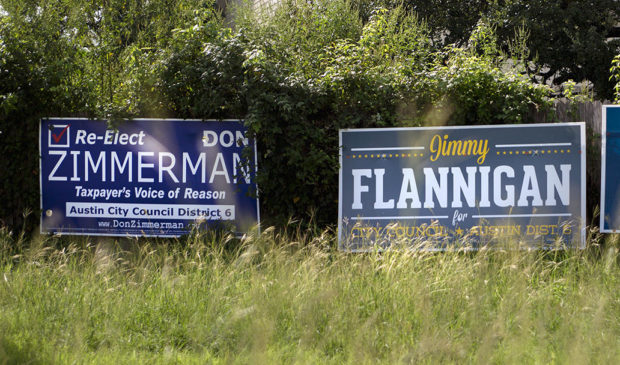More than a yard sign: A runoff rematch in District 6
Wednesday, September 14, 2016 by
Audrey McGlinchy, KUT Austin’s District 6 is one of the city’s wealthiest – the median family income is about $86,000 a year. It also boasts the largest number of Asian residents in the city.
Council Member Don Zimmerman represents Austin’s northernmost district. He has served as a resounding voice of fiscal conservatism, often abstaining from votes because of a general aversion toward government spending.
This year, he faces only one opponent: Jimmy Flannigan, also his challenger in 2014. Zimmerman just squeaked by to win the runoff in that race.
To better inform voters, we thought we would focus on three of the big issues of the last year-and-a-half of Austin’s first 10-1 Council. We asked non-incumbents how they would have voted on these major issues. Then we added one more category: We asked incumbents to name a pet project and non-incumbents to tell us what they’d like to focus on.
It’s all part of our “More Than a Yard Sign” series. (The first two installments, which focus on districts 2 and 4, are available here.)
Jimmy Flannigan

An online marketer and community activist, Flannigan helped found the Northwest Austin Coalition and at one time served as president of the Austin Gay and Lesbian Chamber of Commerce.
Flannigan lost to Zimmerman in 2014, garnering just 191 fewer votes than Zimmerman in a December runoff election.

Although the bond has its flaws and Flannigan would like to have seen more money for District 6, he said, he nonetheless supports it.
“At the end of the day, the vast majority of that bond project is vetted corridors that have gone through extensive community input, that residents from multiple districts drive on, that all need to get built,” said Flannigan.

As it played out, Flannigan said he didn’t understand why Council pursued requiring fingerprint-based background checks for ride-hailing companies in the first place.
“I didn’t see the evidence that fingerprints made a substantial difference in public safety,” he said. Companies Uber and Lyft shut down Austin operations after voters supported Council regulations.

“For the vast majority of homeowners, you’re talking a few bucks,” said Flannigan.
He called the homestead exemption a “red herring” that distracts the public from the fact that Council still has the ability to raise the city’s tax rate, potentially nullifying any break that a homestead exemption grants on property taxes.

Flannigan said as a representative of one of Austin’s most outer-lying districts, he would stress the relationship between housing prices and traffic.
“When Austin doesn’t build enough housing for the folks who want to live here, District 6 suffers,” he said. “[Residents move to] Cedar Park and Leander, and they drive through District 6.”
Don Zimmerman

Council Member Don Zimmerman prides himself on being a “voice of the taxpayer,” often questioning city staff about the finances of a contract.
Born in San Antonio, Zimmerman worked as a software engineer before being elected to Council.

Although Zimmerman supported the bond on an initial vote, he abstained from casting a final vote on the measure in August. He said he would have preferred to split the bond up into parts, and to require more specific language on the ballot about the tax impact to residents.

An advocate for limited government regulation of private business, Zimmerman vehemently opposed the requirement that all ride-hailing drivers get fingerprinted. When the item went to a public vote and residents rejected lighter regulations, Zimmerman sued the city over what he claimed was misleading ballot language.

While this year Zimmerman supported an 8 percent homestead exemption, up from 6 percent last year, he said he would have supported a greater increase.
“I’m very disappointed that we didn’t do 4 percent to keep on track with our commitment to reach the 20 percent within four years,” he told his colleagues on the dais.

Zimmerman said he is committed to working with the Texas Department of Transportation to build a new freeway in northwestern Austin.
“I’ll do everything I can to make that happen,” he said, adding that roads, not alternatives, are what his constituents have said they want. “[City staff] use traffic congestion as a social engineering tool to try to get you to ride a bike, or take a bus, or go find a train, and that’s not working.”
This story was produced as part of the Austin Monitor’s reporting partnership with KUT. Photo by Miguel Gutierrez Jr./KUT
The Monitor’s work is made possible by donations from the community. Though our reporting covers donors from time to time, we are careful to keep business and editorial efforts separate while maintaining transparency. A complete list of donors is available here, and our code of ethics is explained here.
You're a community leader
And we’re honored you look to us for serious, in-depth news. You know a strong community needs local and dedicated watchdog reporting. We’re here for you and that won’t change. Now will you take the powerful next step and support our nonprofit news organization?














